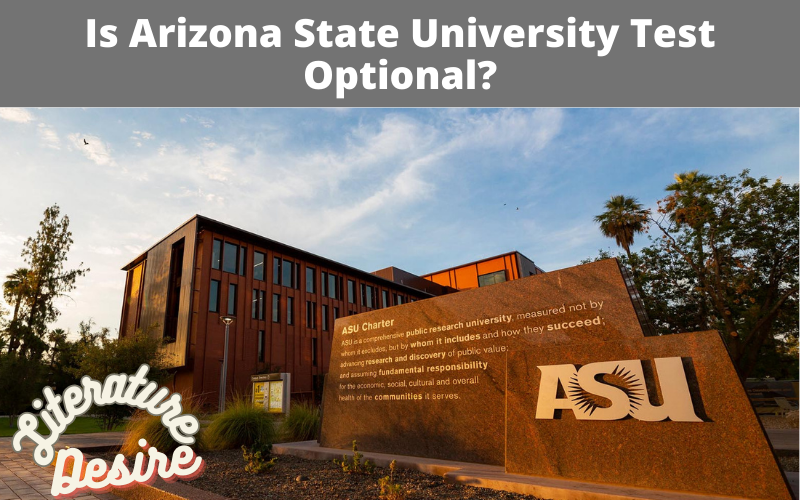Is Arizona State University Test Optional? Arizona State University (ASU) is a renowned institution that attracts thousands of students from around the world.
As the college admissions landscape continues to evolve, one question that often arises is whether ASU follows a test-optional policy. In this article, we will explore the concept of test-optional, discuss its implications for prospective students, and provide insights into ASU’s approach to standardized tests.
By the end, you will have a comprehensive understanding of ASU’s test-optional policy and how it may affect your college application process.
Is Arizona State University Test Optional?
Arizona State University is an accredited university. In recent years, the debate surrounding standardized testing in college admissions has gained significant attention. Many universities, including Arizona State University, have embraced the test-optional policy, allowing students to decide whether to submit their SAT or ACT scores as part of their application.
This shift acknowledges that academic potential and achievements extend beyond test scores alone. It creates a more inclusive environment, where students can showcase their unique strengths and talents through alternative means.
Understanding Test-Optional Policies
A test-optional policy means that applicants have the choice to submit their test scores or omit them from their application. ASU recognizes that some students may face challenges in accessing or preparing for standardized tests.
By implementing a test-optional policy, ASU aims to remove barriers and provide equal opportunities for all applicants to showcase their qualifications.
The Approach of Arizona State University to Standardized Testing
Arizona State University is committed to holistic admissions and understands that test scores may not always accurately reflect a student’s potential or readiness for college.
The university evaluates applicants based on a comprehensive review process, taking into account factors such as high school coursework, GPA, extracurricular activities, essays, letters of recommendation, and personal achievements.
This approach allows ASU to assess applicants in a more well-rounded manner.
Benefits of a Test-Optional Policy
Inclusivity:
The test-optional policy encourages students from diverse backgrounds to apply, including those who may not have had access to test preparation resources.
Reducing Stress:
Removing the mandatory submission of test scores alleviates the pressure associated with standardized tests, allowing applicants to focus on other aspects of their application.
Flexibility:
Students can choose to highlight their strengths and achievements through other means, such as their essays, recommendation letters, or portfolio submissions.
Demonstrating Resilience:
The test-optional policy recognizes that single test performance can not determine the potential of students, but rather their overall academic journey and personal growth.
Considerations for Test-Optional Applicants
While the test-optional policy at ASU offers flexibility, it’s important for applicants to carefully consider their individual circumstances before deciding whether to submit test scores.
Factors such as their academic background, strengths, and the competitiveness of their desired program should be taken into account.
Applicants are encouraged to research the specific requirements of their intended major or program to make an informed decision.
Preparing a Strong Application Without Test Scores
For students opting not to submit test scores, there are several strategies to strengthen their application:
Focus on Academic Achievement:
Highlighting exceptional grades, challenging coursework, and academic honors can demonstrate intellectual ability and dedication to learning.
Showcase Extracurricular Involvement:
Active participation in clubs, sports, community service, or leadership roles can highlight a student’s diverse skills, interests, and commitment outside the classroom.
Write Compelling Essays:
Thoughtful and well-written essays provide an opportunity to showcase personal experiences, values, goals, and how ASU aligns with their aspirations.
Submit Strong Letters of Recommendation:
Recommendations from teachers, mentors, or employers who can speak to an applicant’s character, achievements, and potential can greatly enhance their application.
Tips for Submitting a Compelling Application
To maximize the chances of admission to ASU, consider the following tips:
Conduct Thorough Research:
Understand ASU’s values, programs, and campus culture to tailor your application accordingly.
Start Early: Is Arizona State University Test Optional?
Begin preparing your application well in advance to allocate sufficient time for gathering documents, writing essays, and seeking recommendation letters.
Seek Guidance: Is Arizona State University Test Optional?
Reach out to your high school counselors, college advisors, or ASU admissions representatives for assistance throughout the application process.
Be Authentic: Is Arizona State University Test Optional?
Be true to yourself and present a genuine portrayal of your achievements, aspirations, and interests.
Proofread and Edit:
Review your application materials multiple times to ensure accuracy, coherence, and clarity.
Financial Aid and Scholarships
ASU is dedicated to making education affordable and offers various financial aid options, including scholarships, grants, work-study programs, and loans.
By submitting the Free Application for Federal Student Aid (FAFSA) and the ASU Scholarship Application, students can explore potential funding opportunities to support their academic journey.
Campus Life at ASU
ASU boasts a vibrant and diverse campus community, providing numerous opportunities for personal growth, engagement, and social interaction. From student clubs and organizations to sports events and cultural activities, there is something for everyone at ASU.
The university’s commitment to innovation, sustainability, and entrepreneurship creates an environment that nurtures creativity and collaboration.
Conclusion
In conclusion, Arizona State University has embraced a test-optional policy to provide students with the flexibility to choose whether to submit their standardized test scores.
This approach recognizes the multifaceted nature of student potential and allows applicants to showcase their qualifications through various means. By focusing on holistic admissions and considering factors beyond test scores, ASU ensures a fair evaluation process.
Whether you decide to submit test scores or not, it is essential to craft a strong application that highlights your achievements, experiences, and aspirations. ASU welcomes all students who are committed to learning, growing, and making a positive impact on their communities.
Frequently Asked Questions
Yes, ASU’s test-optional policy applies to all undergraduate programs.
No, ASU follows a holistic review process where test scores are just one aspect considered. Omitting test scores will not automatically disadvantage your application.
Yes, you can update your application to include or exclude test scores until the application deadline.
How do I indicate that I want my test scores to be considered as part of my application?
When filling out the application, there will be a section where you can choose to submit or omit your test scores.
Can international students apply under the test-optional policy?
Yes, the test-optional policy applies to both domestic and international applicants.



